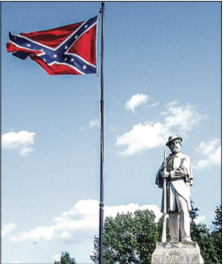Reflecting on history
Respecting public property and our nation’s history

STATUES — Confederate war memorials vandalized following Charlottesville.
Google Image
Various groups across America have called for either the removal or destruction of all Confederate monuments. According to them, these statues have always been symbols of racism and oppression, offending all who come within their sight.
However, I personally believe the statues should stay because of their historical significance. But if they go, vandalism should not be the means.
In a country that prioritizes symbolism over substance and political correctness over reason, the public’s perception of historical monuments has taken a turn for the worse. How should society view Confederate monuments? And, if these statues should be taken down, by whom and by what means?
To properly answer these questions, you have to consult history. When observing historical figures like Robert E. Lee and past U.S. presidents, it is important to judge their merits through the lens of their culture and not by modern standards.
Unfortunately, many progressives have decided on the latter, resulting in vandalism of public property. Following the horrific events in Charlottesville, a group of social justice warriors in Durham, North Carolina tore down a Confederate monument with ropes. In Washington, D.C. paint was used to vandalize a statue of confederate general Albert Pike. Even further, a VICE editor suggested that Mount Rushmore be blown up for displaying our slave-owning Founding Fathers.
In an attempt to eradicate racism from the United States, these radical progressives have proven their inability to think critically about historical figures.
The majority of Confederate monuments were built in the early to mid-twentieth century—such as the Durham monument in 1924—years after the Civil War. These statues were primarily built to honor those who served and highlight key events in our nation’s history, not to commemorate slavery and white supremacy.
Where does it stop? Slavery played a significant role in American history, so, fundamentally, many of our Founding Fathers were likely slave owners. Does this give citizens the right to vandalize Monticello, the home of Thomas Jefferson? What about George Washington? Should his face be blown off of Mount Rushmore for owning slaves? Should all statues of Abraham Lincoln, who considered inner-racial marriage a heinous crime, be taken down? If we tolerate the removal of these monuments, progressives could demand the confiscation of every historical statue in America.
In 2016, at the grand opening of the National Museum of African American History and Culture, former President George W. Bush said that “a great nation does not hide its history; it faces its flaws and corrects them.”
I urge America to heed these words. There is so much to learn from our Founding Fathers, and removing their monuments reduces the likelihood for learning and acknowledgement to occur.
These historical figures were influenced by culture. Instead of judging our Founding Fathers by modern standards, we need to acknowledge their sins, but also recognize their contribution to America. Slavery was a cultural and national problem, not solely an individual problem.
In my opinion, Jefferson and Washington were among the greatest Americans to walk the earth. They were great Americans for reasons unrelated to slavery. Thomas Jefferson, for example, was a champion for free speech, a principle progressives are taking full advantage of. Had he stayed silent, Americans would not enjoy the freedoms they currently possess.
Whether you believe historical monuments should remain displayed in public squares or collect dust in museums, we should all agree that vandalism of public or private property cannot be tolerated, regardless of political or social views.
Smith is the asst. sports editor.
